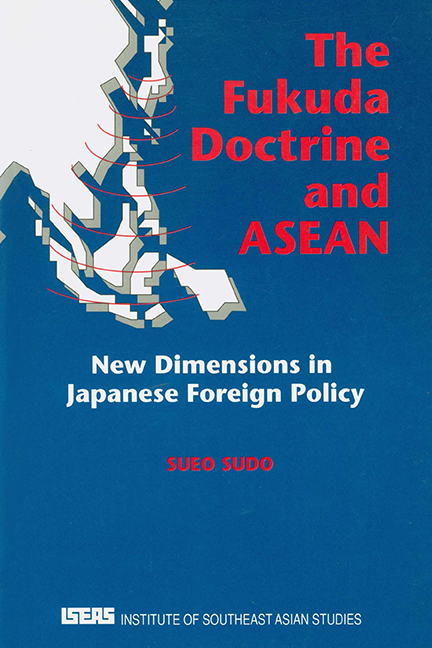Book contents
- Frontmatter
- Dedication
- Contents
- List of Tables
- Preface
- Abbreviations
- Introduction
- chapter one A Framework for Analysing Japanese Policy Towards Southeast Asia
- chapter two Post-war Japan's Re-entry into Southeast Asia
- chapter three Japan's Policy Towards Regional Development
- chapter four External Challenge and Changing Japan-Southeast Asia Relations; 1975–77
- chapter five A Changing Southeast Asia in Japanese Politics
- chapter six Formulating the First Doctrine in Japanese Foreign Policy
- chapter seven Japan's ASEAN Policy, 1977–87
- chapter eight Conclusion
- Appendices
- Bibliography
- Index
- THE AUTHOR
chapter two - Post-war Japan's Re-entry into Southeast Asia
Published online by Cambridge University Press: 21 October 2015
- Frontmatter
- Dedication
- Contents
- List of Tables
- Preface
- Abbreviations
- Introduction
- chapter one A Framework for Analysing Japanese Policy Towards Southeast Asia
- chapter two Post-war Japan's Re-entry into Southeast Asia
- chapter three Japan's Policy Towards Regional Development
- chapter four External Challenge and Changing Japan-Southeast Asia Relations; 1975–77
- chapter five A Changing Southeast Asia in Japanese Politics
- chapter six Formulating the First Doctrine in Japanese Foreign Policy
- chapter seven Japan's ASEAN Policy, 1977–87
- chapter eight Conclusion
- Appendices
- Bibliography
- Index
- THE AUTHOR
Summary
Although Japan was admitted to the club of nations and regained its independence, the conclusion of the San Francisco peace treaty in 1951 did not fully settle the differences between Japan and its Asian neighbours. Most of the Southeast Asian nations withheld ratification of the peace treaty until the settlement of reparations, demanding across-the-board restitution of war losses. To restore friendly relations with them, therefore, Japan's positive action was of great necessity; hence war reparations, economic aid and trade.
During the 1950s, because it was difficult for Japan to rely on the China market Japanese policy-makers began to regard Southeast Asia as a raw materials supplier and a lucrative market for Japan's products. The region became the prime target for Japan's “economic diplomacy”, a policy initiated by Prime Minister Yoshida and carried out vigorously by successive administrations without due consideration of the voices of the Southeast Asian countries. Prime Minister Nobusuke Kishi (1957–60) in particular finalized Japan's economic linkage with the region by resolving the reparations negotiations and, more importantly, by visiting the region in 1957 – the first prime minister to do so since World War II. Unlike Yoshida's enigmatic triangular relationship with strong U.S. support, or to put it bluntly “riding on the American Asian policy”, Kishi attempted to cultivate closer Japan”Southeast Asia relations with less dependence on Washington. To be sure, it was a successful re-entry, but not a smooth transition.
JAPAN's REPARATIONS POLICY AND SOUTHEAST ASIA
After acceptance of the Potsdam Declaration in August 1945, Japan was put under the control of the Allied Powers (or SCAP – Supreme Commander for the Allied Powers), which was led by General Douglas MacArthur until 11 April 1951 and by General Matthew Fidgway until 28 April 1952. Like other defeated countries, Japan invariably faced its reparations obligation, as the Potsdam Declaration stipulated: “Japan shall be permitted to maintain such industries as will sustain her economy and permit the exaction of just reparations in kind, but not those which would enable her to re-arm for war.
- Type
- Chapter
- Information
- The Fukuda Doctrine and ASEANNew Dimensions in Japanese Foreign Policy, pp. 24 - 52Publisher: ISEAS–Yusof Ishak InstitutePrint publication year: 1992

